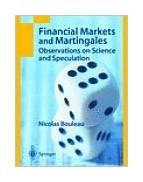|
||
podział tematyczny • wydawnictwa anglojęzyczne podział tematyczny Newsletter: • Zamów informacje o nowościach z wybranego tematu Informacje: • sposoby płatności i dostawy • kontakt • Cookies na stronie • Regulamin zakupów Napisz propresssp@gmail.com |
FINANCIAL MARKETS AND MARTINGABLES OBSERVATIONS ON SCIENCE AND SPECULBOULEAU N.wydawnictwo: SPRINGER , rok wydania 2004, wydanie Icena netto: Is it really possible to make money on the financial markets? This is just one of the questions posed in this practical and thought-provoking book, winner in the original french version, of the "Best financial economics book" prize 1999 from the Institute de Haute Finance, and the "Prix FNAC-Arthur Anderson du meilleur livre d'entreprise 2000". Starting with games of chance, from which probability theory was born, Nicolas Bouleau explains how the financial markets operate, and demonstrates how the application of mathematics has turned finance into a high-tech business, as well as a formidable and efficient tool. The human side of finance is also considered, with a look at the influence of the trader and the working relationships that are woven into the market rooms. Concise and accessible, with no previous knowledge of finance or mathematics required, the aim of this book is simply to articulate the main ideas and put them into perspective, leading readers to a fresh understanding of this complex area Written for: Table of contents Introduction.- Part I: Martingales.- Luck in the Casino; The Stock Market and Probability; Mathematical Development Outside the Financial Sector.- Part II: Option Hedging: An Epistemological Rupture.- The Unexpected Connection; A Different Approach; Hedging Risks Thanks to the Market.- Part III: Science and Speculation.- A Complex Dynamic; Illusions of Chance; Three Types of Speculation; Practical and Moral Values.- Part IV: The Stakes and the Payoffs.- Markets and Economy; The Special Role of Finance in the Production of Knowledge; Power and Innocence in Finance; Long Term Risks.- Conclusion.- Glossary.- Bibliography.- Index 150 pages Księgarnia nie działa. Nie odpowiadamy na pytania i nie realizujemy zamówien. Do odwolania !. |


